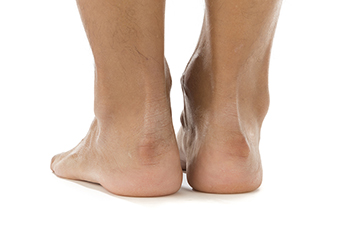Types and Causes of Foot Deformities
Tuesday, 23 July 2024 00:00 The human foot is a complex structure of bones, joints, muscles, tendons, and ligaments. It carries the body’s weight and enables upright walking, providing stability and flexibility. However, foot deformities can arise from various factors such as external pressures, certain foot postures, or underlying medical conditions. While some deformities are present at birth, others develop over time and can lead to significant discomfort and mobility issues. Splayfoot occurs when the metatarsal bones spread out, which causes the front of the foot to widen and can lead to pain and calluses. Fallen arches, or flat feet, result in the entire sole touching the ground due to weak foot muscles or wearing unsuitable footwear and causing long-term discomfort. Pronated feet, where the heel leans inward, often develop in overweight individuals or those with knock-knees. This may also lead to pain in the knees, hips, and back. High-arched feet place excessive pressure on the ball of the foot, increasing the risk of ankle injuries. If you are experiencing pain resulting from a foot deformity, it is suggested that you schedule an appointment with a podiatrist for an exam, diagnosis, and treatment options.
The human foot is a complex structure of bones, joints, muscles, tendons, and ligaments. It carries the body’s weight and enables upright walking, providing stability and flexibility. However, foot deformities can arise from various factors such as external pressures, certain foot postures, or underlying medical conditions. While some deformities are present at birth, others develop over time and can lead to significant discomfort and mobility issues. Splayfoot occurs when the metatarsal bones spread out, which causes the front of the foot to widen and can lead to pain and calluses. Fallen arches, or flat feet, result in the entire sole touching the ground due to weak foot muscles or wearing unsuitable footwear and causing long-term discomfort. Pronated feet, where the heel leans inward, often develop in overweight individuals or those with knock-knees. This may also lead to pain in the knees, hips, and back. High-arched feet place excessive pressure on the ball of the foot, increasing the risk of ankle injuries. If you are experiencing pain resulting from a foot deformity, it is suggested that you schedule an appointment with a podiatrist for an exam, diagnosis, and treatment options.
If you have any concerns about your feet, contact Dr. Eugenio Rivera from Calo Foot & Ankle Specialists. Our doctor can provide the care you need to keep you pain-free and on your feet.
Biomechanics in Podiatry
Podiatric biomechanics is a particular sector of specialty podiatry with licensed practitioners who are trained to diagnose and treat conditions affecting the foot, ankle and lower leg. Biomechanics deals with the forces that act against the body, causing an interference with the biological structures. It focuses on the movement of the ankle, the foot and the forces that interact with them.
A History of Biomechanics
- Biomechanics dates back to the BC era in Egypt where evidence of professional foot care has been recorded.
- In 1974, biomechanics gained a higher profile from the studies of Merton Root, who claimed that by changing or controlling the forces between the ankle and the foot, corrections or conditions could be implemented to gain strength and coordination in the area.
Modern technological improvements are based on past theories and therapeutic processes that provide a better understanding of podiatric concepts for biomechanics. Computers can provide accurate information about the forces and patterns of the feet and lower legs.
Understanding biomechanics of the feet can help improve and eliminate pain, stopping further stress to the foot.
If you have any questions please feel free to contact our office located in Bellaire, TX . We offer the newest diagnostic and treatment technologies for all your foot and ankle needs.









